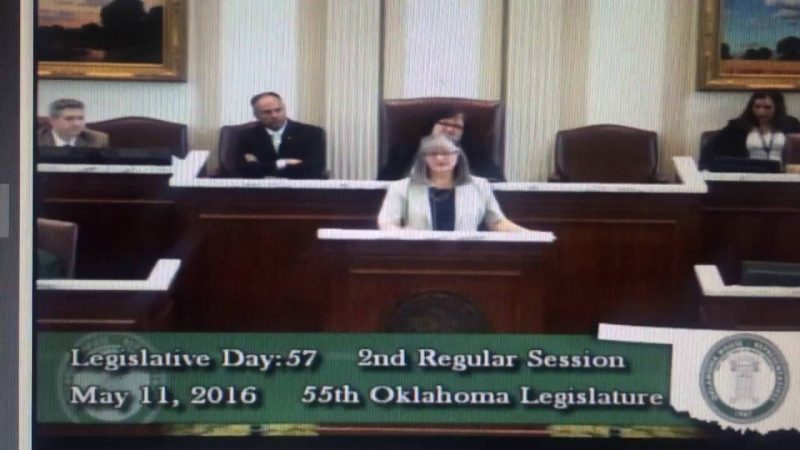Last week, it was reported that Oklahoma State Rep. Sally Kern had introduced legislation that would restrict the “use of incompatibility as a ground for divorce” in the state, changing the law to prevent couples from getting divorced is “there are living minor children of the marriage, the parties have been married 10 years or longer, [or] either party files a written objection to the granting of a divorce.”
On Friday, Alan Colmes had Kern on his radio program to “defend” the bill … and I put the word “defend” in quote because she didn’t really defend it at all. In fact, she didn’t really seem to even understand her own bill.
When Colmes asked Kern why those who had been married for more than 10 years couldn’t get divorced, Kern said that she didn’t know and that it would probably be taken out. And when Colmes asked her why the state was mandating that couples could not get divorced if one party objected, Kern insisted that that provision was really more of a “cooling off provision” that was designed to protect the “due process rights” of the other party who might not want to get divorded. But, as Colmes pointed out, Kern’s bill does not state that it is a “cooling off” provision, but rather flatly prevents couples from getting divorced, Kern insisted that that “was not the intent of the bill.”
Really? That’s a little difficult to understand considering that the text of the bill makes it pretty clear that is exactly its intent. (Interestingly, notice how Kern’s bill still allows for divorce on the ground of “impotency” while eliminating it on the grounds of “incompatibility”):
STATE OF OKLAHOMA
2nd Session of the 52nd Legislature (2010)
HOUSE BILL 2279 By: Kern
AS INTRODUCED
An Act relating to marriage, amending 43 O.S. 2001, Section 101, which relates to grounds for divorce; restricting the use of incompatibility as a ground for divorce; and providing an effective date.
BE IT ENACTED BY THE PEOPLE OF THE STATE OF OKLAHOMA:
SECTION 1. AMENDATORY 43 O.S. 2001, Section 101, is amended to read as follows:
Section 101. The district court may grant a divorce for any of the following causes:
First. Abandonment for one (1) year.
Second. Adultery.
Third. Impotency.
Fourth. When the wife at the time of her marriage, was pregnant by another than her husband.
Fifth. Extreme cruelty.
Sixth. Fraudulent contract.
Seventh. Incompatibility. Provided, however, that the court shall not grant a divorce on the ground of incompatibility if:
1. There are living minor children of the marriage;
2. The parties have been married ten (10) years or longer; or
3. Either party files a written objection to the granting of a divorce.Eighth. Habitual drunkenness.
Ninth. Gross neglect of duty.
Tenth. Imprisonment of the other party in a state or federal penal institution under sentence thereto for the commission of a felony at the time the petition is filed.
Eleventh. The procurement of a final divorce decree without this state by a husband or wife which does not in this state release the other party from the obligations of the marriage.
Twelfth. Insanity for a period of five (5) years, the insane person having been an inmate of a state institution for the insane in the State of Oklahoma, or inmate of a state institution for the insane in some other state for such period, or of a private sanitarium, and affected with a type of insanity with a poor prognosis for recovery; provided, that no divorce shall be granted because of insanity until after a thorough examination of such insane person by three physicians, one of which physicians shall be a superintendent of the hospital or sanitarium for the insane, in which the insane defendant is confined, and the other two physicians to be appointed by the court before whom the action is pending, any two of such physicians shall agree that such insane person, at the time the petition in the divorce action is filed, has a poor prognosis for recovery; provided, further, however, that no divorce shall be granted on this ground to any person whose husband or wife is an inmate of a state institution in any other than the State of Oklahoma, unless the person applying for such divorce shall have been a resident of the State of Oklahoma for at least five (5) years prior to the commencement of an action; and provided further, that a decree granted on this ground shall not relieve the successful party from contributing to the support and maintenance of the defendant. The court shall appoint a guardian ad litem to represent the insane defendant, which appointment shall be made at least ten (10) days before any decree is entered.
SECTION 2. This act shall become effective November 1, 2010.








